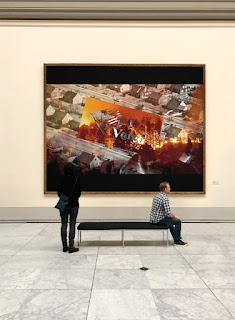The Art of Not Telling People What To Do
--
There's a fine line between trying to control someone and suggesting an action that you think would be in their best interest. This seems readily apparent, yet with the lack of self awareness and moral righteousness in today's climate, the lines have become significantly blurred. Out of this vortex of contextual calamity, comes some uncomfortable realizations of how most or (all) of us have been projecting our own unchecked wants and desires onto the world around us. It is lock step and key with how fragile and emotionally manipulative the culture has become in all aspects. Politically. Socially. Spiritually. Symbolically.
We are constantly inundated with "should" statements catering to our insecurities. That is the the essence and mechanistic nature of advertising and marketing. It's a type of trickle down effect. We absorb the bite size moral and truth claims around and pass it along to people we interact with on a daily basis. Turning half chewed truths into bite size bits that can fit into catch phrases and hashtags. Most of us aren't even aware of of our self righteous posturing and moralizations that we don't even care to check ourselves and our transient projective states.
We see what we want to see and we want other people to follow along. There is a great sense of belonging in conformity even if the structural integrity is bare of mildly deceptive. We are told to help out others, be kind, vote, do the right thing, don't get too close to one another and respect other people's ideas and opinions. Most of it is boiler plate social interaction, but when things are constantly jammed down your throat you start to feel like there isn't much room to simply be yourself without someone looking over your shoulder trying to usher your next move. When rules become annoying and constantly enforced, there will always be a slow resistance to the status quo. When we see someone stepping out of line, then we may feel discomfort. Should we say something? Should we do something or just let things ride out and people live out their dysfunctional antics?
We may think we know what is right, but we may not even have the authority or reason to try to enforce it. Most of us are terrible enforcers. And that's not a bad thing at all. The best thing we can do is truly listen and not be so anxious as to just wait till it our time to speak. If we know what is best for us then the best thing to do is to act it out for ourselves. Any inspiration or imitation that comes from that is a bonus, but not necessarily a goal. When we venture our in lecturing others on how to act then we enter a dimension of potential conflict and discomfort. Who are we to say that we think we know better? That is a great question.
When we can't enforce what we want on others, than we tend to look towards people with more authority. Leaders. Politicians. Influencers. All ways of escaping some of the unchecked helplessness and insecurities collectively within us.
If someone chooses not to do something that the status quo is not doing then we can certainly keep moving forward. If a person does not want to vote, what good is it to keep telling that person or people in general to vote? That is a specific example, but the concept travels to all parts of life both literally and symbolically. Most of us see evangelical religious zealots as a nuisance and would rather not be told what to do or what to believe. Most of us don't want to be bothered by salesman on the street and told that their product with greatly enhance our lives. It seems clear that letting things be in this world is much harder than trying to change the behaviors of people we know and strangers we may never meet. As long as someone is not hurting or trying to manipulate someone into a sketchy situation then what necessarily is the problem.
Lead by example. Actions speak louder than words. That is what has been taught to most of the youth of today. It's an old adage that has lasted...for a reason. Also, what good is there trying to make people act the way that you want to see them? Wouldn't that just create a stagnate atmosphere void of nuance and discovery? We can learn from the uncomfortable actions of others and improve upon how we act. Ultimately we can only be responsible for what we do and hope that we do not create a harmful situation for another. Our actions can have a ripple effect. This can all happen by action and not proselyting a certain way to live.
The act of telling people what to do is the same act of telling people what not to do. The power of suggestion can go along away, but commands have the ability to turn off and create conflict among people. How does it make us feel when we feel people are trying to command us? Like they know any better for us at this very moment at this very time? There may not even be a concrete answer for this and that's ok. We can only know our story. When we try to tell people what to do without knowing their full story on why they are acting they do the we are doing a great disservice. Unfortunately, we don't have the ability to go into the minds of others and really nail down their intentions and chemical reactions that make them act the way they do. We can only speculate. We can only project. We can only create a distorted idea on what we think might need to get done. And at the end of the day, do we really need to do any more than listen? Do we really even have the ability to tell someone that they should do something that we think will better their life? Listening can go a long way. Listening is an act of love.
The power of persuasion is not built on the need to control. Persuasion is best when acted out and not talked about or enforced.
What part of us telling people what to do deals with convenience?
What part of people telling people what to do just has to do with compliance?
Compliance and convenience can have a symbiotic relationship. If everyone just complied with a certain action or behavior then there would be no need or waste of energy to tell the ones not complying to simply fall in line. Some people have a smug sense of moral superiority and love to tell people what to do. The more you get use to telling people what to do, the more you crave the draws of power. Then there comes the possibility of a power imbalance. It is no surprise that most people would choose to have power over others than the other way around. If it's more convenient to comply, most people will just comply as to not encounter conflict.
Who am I to tell you that you can't or can do something? Who are you too? There are so many factors at play. Some many things to consider. Ask yourself, are you just wanting someone to do something to your ideal or are you genuinely doing it in a selfless manner? There has to be a little bit of self interest and projection to even consider trying to tell someone what to do. This is neither good or bad. Just an observation.
Ask yourself:
Am I really qualified to tell people what to do? What makes you qualified? What makes you think you can be qualified to tell someone what to do? How much of it is just about YOU?
~DG



Comments
Post a Comment